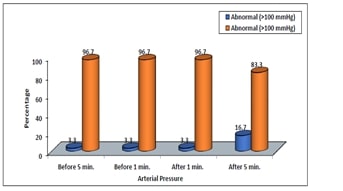Effectiveness of Short Term Foot Massage on Mean Arterial Pressure among Neurosurgical Patients at Surgical ICU

Abstract:
This
hydrostatic pressure is around 100 mmHg and varies with height. The mean
arterial pressure on the foot may therefore increase to 90–190 mmHg and the
venous pressure may increase to about 10–110 mmHg upon adoption of the erect
position. Passive exercise such as foot massage can have a calming impact by
lowering blood pressure and sympathetic nervous system activity. Reducing blood
pressure and boosting the body’s blood flow. Short-term foot massage is a
systematic technique in which the health of connected body parts can be
affected by applying pressure to specific points on the hands and feet. This
study aimed to examine the immediate effects of brief foot massage on mean
arterial Pressure among neurosurgical patients admitted to intensive care
units. The following
are the objectives of the study, to
determine the patient with neurosurgery’s pre-test level mean arterial
pressure, to evaluate the impact of brief foot massage on patients undergoing
neurosurgery’s mean arterial pressure, and to relate the post-test mean
arterial pressure to a few demographic factors. For this study, a quantitative
research strategy was adopted. This study used a quasi-experimental research
design as its methodology. The study was carried out at SMCH. Based on
inclusion criteria, a total of 60 study participants were chosen through
convenience sampling. A demographic questionnaire and a blood pressure data
sheet, which were filled out by observation, interviewing, and physiologic
measurement, were used to gather study data. The study results show that the
calculated paired ‘t’ test value of t = 6.078 between before 1 min and after 5
minutes and after 1 minute and after 5 minutes was found to be statistically
significant at p<0.001 level. This infers that the short-term foot massage
administered among the neurosurgical patients was found to be effective in reducing
the level of mean arterial pressure.
References:
[1] Berlin, D. A., Bakker, J. 2015,
Starling curves and central venous pressure. Crit Care. 19(1):55. DOI:
10.1186/s13054-015-0776-1
[2] Magder, S. 2016, Volume and its relationship to
cardiac output and venous return. Crit Care. 20(1):271. Available from:
https://vivo.weill.cornell.edu/display/pubid27872907
[3] Lee, S. M., Kim, H. S. 2014, Effect of foot massage on
blood pressure, heart rate, and respiratory rate in elderly adults. J Altern
Complement Med. 20(12):1023-1028.
[4] Özlü, Z. K., Avşar, G. 2019, The effects of foot
massage on the autonomic nervous system and the hemodynamic parameters in
patients admitted to the intensive care unit. J Clin Nurs. 28(19-20):3638-3649.
[5] Mok, E., Woo, C. P.2013, Effect of massage therapy on
vital signs and hemodynamic parameters in critically ill patients. Int J
Nurs Stud. 50(7):798-805.
[6] McVicar, A. J., Greenwood, C. R., Fewell, F., D'Arcy,
V., Chandrasekharan, S. 2007, Effects of
reflexology on blood pressure and anxiety: A randomized controlled trial in
patients with hypertension. Complement Ther Clin Pract. 13(2):110-115.
Available from: https://doi.org/10.1016/j.ctcp.2007.01.005
[7] Vedel, A. G., Holmgaard, F., Rasmussen, L. S., Paulson,
O. B., Thomsen, C., Danielsen, E. R., 2016, Perfusion Pressure Cerebral Infarct
(PPCI) trial – the importance of mean arterial pressure during cardiopulmonary
bypass to prevent cerebral complications after cardiac surgery: Study protocol
for a randomised controlled trial. Trials. 17(1):247.
[8] Hinkle, J. L., Cheever, K. H. 2016, Brunner & Suddarth’s
textbook of medical-surgical nursing. Lippincott Williams & Wilkins
[9] Gélinas, C. 2007, Management of pain in cardiac
surgery ICU patients: Have we improved over time? Intensive Crit Care Nurs.
23(5):298-303.
[10] Thibaut, F. A., Chatelle, C., Wannez, S., Deltombe, T.,
Stender, J., Schnakers, C. 2015, Spasticity in disorders of consciousness: A behavioral
study. Eur J PhysRehabil Med. 51(4):389-97.
[11] Marini, J. J., Vincent, J. L., Wischmeyer, P., Singer,
M., Gattinoni, L., Ince, C. 2013, Our favorite unproven ideas for future
critical care. Crit Care. 2013;17(Suppl 1).
[12] Tracy, M. F., Chlan, L. 2011, Nonpharmacological
interventions to manage common symptoms in patients receiving mechanical ventilation.
Crit Care Nurse. 31(3):19-28.
[13] Tracy, M. F., Lindquist, R., Savik, K., Watanuki, S.,
Sendelbach, S., Kreitzer, M. J. 2005, Use of complementary and alternative
therapies: A national survey of critical care nurses. Am J Crit Care. 14(5):404-14;
quiz 415-16.
[14] Haddad, S. H., Arabi, Y. M. 2012, Critical care
management of severe traumatic brain injury in adults. Scand J Trauma Resusc
Emerg Med. 20.
[15] Meghani, N., Tracy, M. F., Hadidi, N. N. 2017,
Lindquist R. Part I: The Effects of Music for the Symptom Management of
Anxiety, Pain, and Insomnia in Critically Ill Patients: An Integrative Review
of Current Literature. Dimens Crit Care Nurs. 36(4):234-243.
[16] Triggle, C. R., He, Z. 2015, Impact of complementary
and alternative medicine on cardiovascular disease: Evidence and mechanisms. Evid
Based Complement Alternat Med. 2015:1-12. Available from:
https://doi.org/10.1155/2015/261062
[17] Wang, M. Y., Tsai, P. S., Lee, P. H., Chang, W. Y.,
Yang, C. M. 2008, The efficacy of reflexology: Systematic review. J Adv Nurs.
62(5):512-520. Available from: https://doi.org/10.1111/j.1365-2648.2008.04606.x
[18] Sehhatie Shafaie, F., Jafari, H., Asghari Jafarabadi,
M., Mehrabi, T. 2012, The effect of foot reflexology on physiologic parameters
and mechanical ventilation weaning time in ICU patients. J Caring Sci. 1(4):221-228.
Available from: https://doi.org/10.5681/jcs.2012.031
[19] Bagheri-Nesami, M., Shorofi, S. A., Nikkhah, A.,
Zargar, N. 2014, The effects of foot reflexology massage on anxiety and
hemodynamic parameters in patients undergoing coronary artery bypass graft
surgery: A randomized controlled trial. J Clin Nurs. 23(19-20):2781-2790.
Available from: https://doi.org/10.1111/jocn.12577
[20] Gill, S., Abbot, N. C. 2001, Complementary therapies
and the cardiovascular system. Br J Nurs. 10(18):1162-1170. Available
from: https://doi.org/10.12968/bjon.2001.10.18.9740
[21] Putri, C. N., Permana, B., &Lindayani, L. 2021.
The Effect of Foot Massage on Hemodynamic among Patients Admitted in to the
Intensive Care Unit of General Public Hospital, Indonesia. Konferensi
Virtual Internasional, 805–811.
[22] Azami, H., Ghorbani, F., Razavi, S., &Esfahani, M.
2015, The Impacts of Short-Term Foot Massage on Mean Arterial Pressure of
Neurosurgical Patients Hospitalized in Intensive Care Units. Iranian Journal
of Critical Care Nursing, 8(3), 133–142.

